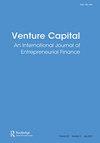The impact mechanism of entrepreneurial competency and entrepreneurial model matching on entrepreneurial performance
IF 2.3
4区 管理学
Q2 BUSINESS, FINANCE
引用次数: 0
Abstract
ABSTRACTFrom the perspective of matching, this paper explores the impact mechanism of entrepreneurial competency and entrepreneurial model matching on entrepreneurial performance. Then this paper uses cluster analysis and independent sample t-test to carry out the empirical analysis. The research results show the following relationship. (1) Entrepreneurs whose risk aversion psychology, entrepreneurial learning cognition, organizational management functions, and genetic network application capabilities are matched with survival-driven entrepreneurial models can improve the survival performance of new ventures. (2) Entrepreneurs whose risk propensity psychology, knowledge conversion cognition, strategic decision-making functions, and industrial network application capabilities are matched with the opportunity-driven entrepreneurial model, which can improve the survival and growth performance of new ventures. (3) Entrepreneurs’ self-potency psychology, technology transformation cognition, R&D innovation function, and network management capabilities are matched with the innovation-driven entrepreneurial model, which can improve the innovation performance of new ventures. Through empirical analysis, it was found that there were 22 matching samples, accounting for 61.11% of samples. There were 14 mismatched samples, accounting for 38.89% of samples, indicating a higher matching degree between entrepreneurial capability cluster and innovation-driven entrepreneurial model.KEYWORDS: Entrepreneurial competencybusiness modelR&D innovation functionentrepreneurial performancematching Disclosure statementNo potential conflict of interest was reported by the author(s).创业胜任力与创业模式匹配对创业绩效的影响机制
摘要本文从匹配的角度探讨创业胜任力和创业模式匹配对创业绩效的影响机制。然后采用聚类分析和独立样本t检验进行实证分析。研究结果表明:(1)风险规避心理、创业学习认知、组织管理功能和遗传网络应用能力与生存驱动型创业模式相匹配的创业者可以提高新创企业的生存绩效。(2)企业家的风险倾向心理、知识转化认知、战略决策功能和产业网络应用能力与机会驱动型创业模式相匹配,可以提高新创企业的生存和成长绩效。(3)企业家的自我效能心理、技术转化认知、研发创新功能和网络管理能力与创新驱动型创业模式相匹配,可以提高新创企业的创新绩效。通过实证分析,发现匹配样本有22个,占样本总数的61.11%。错配样本有14个,占样本总数的38.89%,说明创业能力集群与创新驱动创业模式的匹配程度较高。关键词:创业能力商业模式研发创新职能创业绩效匹配披露声明未发现潜在利益冲突
本文章由计算机程序翻译,如有差异,请以英文原文为准。
求助全文
约1分钟内获得全文
求助全文
来源期刊

Venture Capital
BUSINESS, FINANCE-
CiteScore
4.10
自引率
16.70%
发文量
21
期刊介绍:
Venture Capital publishes cutting edge research-based papers from academics and practitioners on all aspects of private equity finance such as: •institutional venture capital •informal venture capital •corporate venture capital •public sector venture capital •community venture capital It also covers all aspects of the venture capital process from investment decision to exit, including studies on: •investment patterns •investment decision-making •investment performance •realisation of investment value exit routes (including the relationship with junior capital markets such as NASDAQ, EASDAQ, AIM and Nouvelle March). •economic impact and public policy
 求助内容:
求助内容: 应助结果提醒方式:
应助结果提醒方式:


